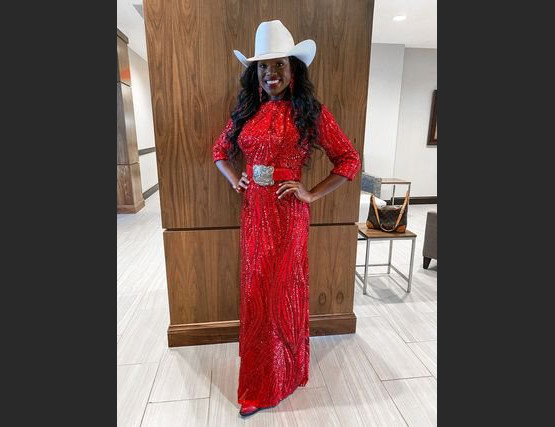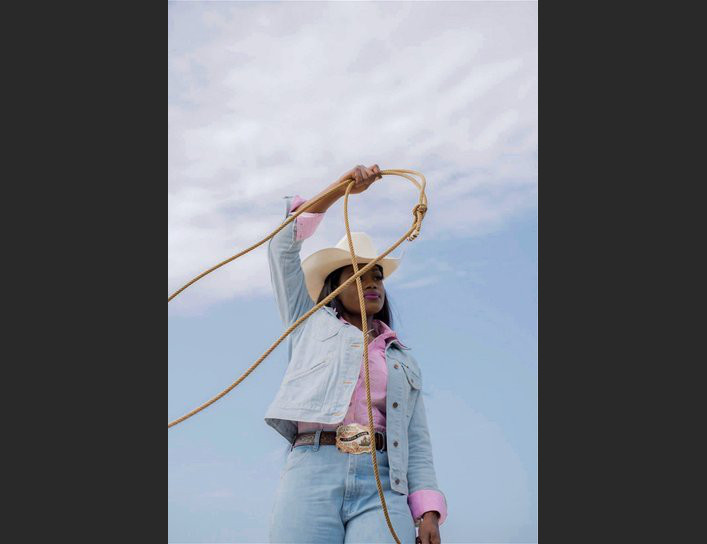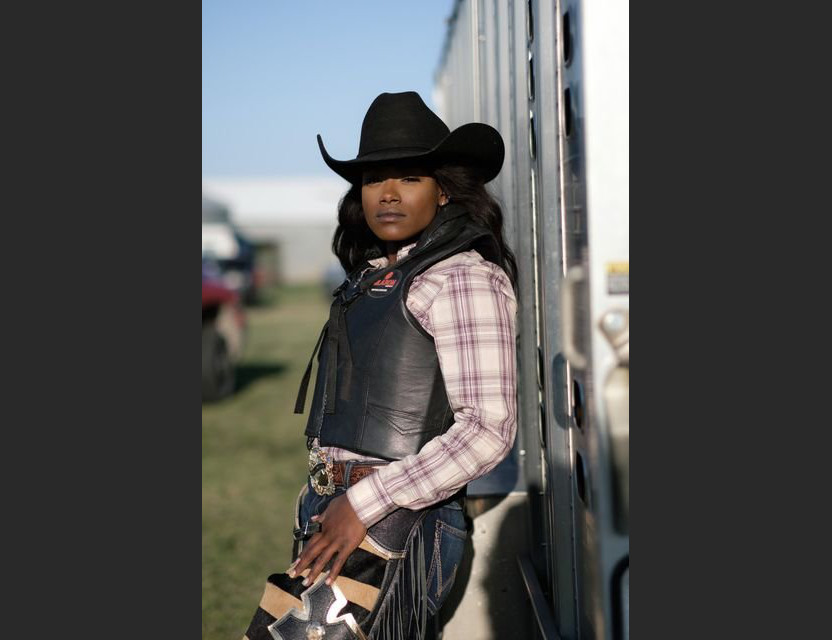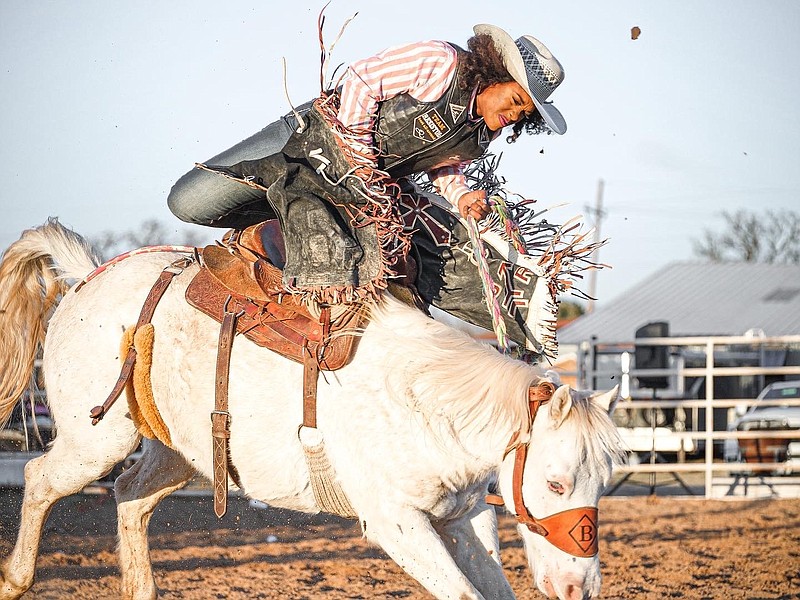Fort Smith native Ja'Dayia Kursh has been defying labels and expectations for most of her life. Born into difficult circumstances, she has refused to become just another statistic, instead breaking through one barrier after another.
"I'm a very dominant person, not really scared to speak up or stand up for myself," she says. "I feel that comes from being the oldest. I had a lot of responsibilities and I feel like I just had to grow up fairly quickly.
"I was very driven. I grew up around everything I knew I didn't want to be."
The milestones of Kursh's life, both salty and sweet, exist in multiples. On the one hand the first-generation collegian graduated from the University of Arkansas's Fulbright College in May, following a career in high school that included playing football for Fort Smith Northside.
On top of that, she holds the distinction of being the first Black rodeo queen in Arkansas history. (It was in 2017, the day she turned 18, that Kursh was crowned Miss Rodeo Coal Hill of Arkansas, earning her the distinction.)
It's a title she has leveraged into her own nonprofit organization and a bustling business as a model and brand ambassador for Western and athletic apparel companies. And even though her face is her franchise, she's still not afraid to get down to rodeo business, riding bucking broncs in competition.
"Rodeo will never be over for me," she says. "I always say I tried to quit being a cowgirl, but you can't quit who you are. I learned that really quick."
Christian Travis has known Kursh since junior high and isn't the least bit surprised at the things she accomplished from such a young age.
'SHE WANTED TO DO IT ALL'
"Anything that sparked her interest, she would go for it 110%, whether it was basketball or football or dancing or horses," he says of his friend. "She's always been like that. She wanted to do it all. And I can tell you that if she does it, she wants to be the best at it. That's just genuinely her character.
"And she can genuinely say she did it on her own. We all have people that help us out along the way, but she has done everything to get to this point by herself. It is inspiring that way; not a lot of people at that age would go through those hardships and continue to fight. She's inspired me to not make excuses."
What gets lost in the bloom of Kursh's many accomplishments are the very bitter seeds from which they sprouted. The galvanized spirit and immovable determination for which she is known was formed early as a response to an upbringing replete with challenges.
"My mom was pregnant with me when she was 15; she had me when she was 16," she says. "When I was 5, my dad went to federal prison until I was like, 13 years old. It was really just me and my mom and my brother for most of my childhood, and with my mom being so young, I feel like I grew up with her."
 Ja’Dayia Kursh made rodeo history in 2017 when she was crowned Miss Rodeo Coal Hill of Arkansas, earning her the distinction of being the first Black rodeo queen in Arkansas. Today, Kursh is a model and brand ambassador for Western and athletic apparel companies, and has her own nonprofit organization. (Special to the Democrat-Gazette)
Ja’Dayia Kursh made rodeo history in 2017 when she was crowned Miss Rodeo Coal Hill of Arkansas, earning her the distinction of being the first Black rodeo queen in Arkansas. Today, Kursh is a model and brand ambassador for Western and athletic apparel companies, and has her own nonprofit organization. (Special to the Democrat-Gazette)
A PERSON'S TRUE GRIT
Kursh's easy manner talking about her formative years is impressive, especially when relating things most people would rather not see in the light of day. But she looks at it differently; difficulty is the distilling agent of one's character, the thing that brings out a person's true grit. In hindsight, every good thing about herself was built on the ashes of adversity, enduring one to achieve the other.
"I was 6 when I first rode a horse. I was at therapy," she says matter-of-factly. "I was sexually assaulted and that's how I was actually introduced to horses — through my counselor.
"Through elementary school, I did not know how to control my emotions. I remember getting in trouble a lot at school for acting out. I did it for attention."
Fortunately, Kursh drew teachers as stubborn as she was, educators who looked past her outbursts and attitude problems to see what was hiding underneath. Eventually, Kursh's walls started to come down and today she considers those instructors to be among the most important adults in her life story.
"I had a lot of teachers who worked with me," she says. "They were there for me, even though we butted heads all the time. To this day, if I needed someone to talk to, I'd go to them."
PIGSKIN AND SADDLES
Once entering junior high, Kursh found other outlets for what she was dealing with on the inside.
"I was in ninth grade when I started playing football and that's what really molded me into the kind of person I am," she says. "I had a lot of things going on up until that point, but when I started playing football, being coached by men and the only girl out there with 110 guys, it was the discipline I needed. I needed correction and I got a lot of it."
About this time, Kursh also started getting involved with rodeo — particularly the Dandies, a well-known mounted drill team — which was quite a trick, considering she was lacking some mandatory ingredients.
"I didn't have a horse or anything," she says. "One of my friends loaned me their horse and we kept it in the backyard. I'd practice just the riding basics. Trying out [for Dandies], I thought I did terrible because I was not the best rider, at all. I didn't know anything about horse etiquette; I would just ride whenever I could."
Kursh nonetheless made the squad, thus finding a home in two activities that held her heart. But being an outsider in both new worlds wasn't without challenges.
"On one hand, I was the Black girl at Northside who wore cowboy boots and spurs and cowboy jeans. People looked at me funny," she says. "Black girls did not like me a lot at Northside because, I remember hearing all the time, I talked white, I thought I was white. But it was never that; I just grew up around white people and I couldn't help that. So, I didn't have a bunch of homegirls at Northside, which is a predominantly Black school."
Kursh did find camaraderie in football, where she played linebacker and defensive end through junior year. But even that came with backlash from female classmates who didn't like the idea of her playing alongside their boyfriends. It finally got to the point where Kursh transferred to Hackett High School for her senior year.
There, "I got to do FFA [Future Farmers of America] and 4-H and that's where all my rodeo friends were," she says. "I was the only Black girl at the school and yet I never dealt with any racism, never felt uncomfortable. These people genuinely loved me."
 Ja’Dayia Kursh shows off her roping skills. (Special to the Democrat-Gazette/Kirstie Marie Photography)
Ja’Dayia Kursh shows off her roping skills. (Special to the Democrat-Gazette/Kirstie Marie Photography)
RODEO-WORLD RACISM
In the rodeo arena, however, things were different. Practically from the moment she made the Dandies team, Kursh felt the cold shoulder from some. Striving to prove herself, she worked fast-food jobs and earned her certified nursing assistant license at 16 to work in a local nursing home, with her earnings going toward buying a truck, trailer and mount of her own. And Kursh initially thrived in the group, making friends and steadily improving as a rider. But once she discovered that what people wouldn't say to her face was readily circulating on social media, her protective wall came back up in a hurry.
"There was a video that was sent to me while I was part of the team. I didn't know these families were making derogatory comments about me," she says. "One of the girls randomly came up to me and said, 'Did you hear about the group chat?' One of my teammate's brothers was calling me a monkey. It changed the way I treated everybody."
Feeling betrayed though she was, Kursh wasn't about to turn tail and quit, even as her outspoken nature increased the friction between herself, fellow riders and even her coach. It was, and still is, a painful chapter in her life, but one she considers vital. When she was crowned Miss Rodeo Coal Hill, she already knew how much of a target her tiara could be.
"I'm not mad about the way they spoke about me, or the things people have said about me," she says. "It built me to be the woman I am today, to speak up about diversity, how I view the Western industry and what I would like to see be different or the things that I want to change.
"It's a very conservative world, rodeo. The things I speak up about and how bold I am, you would never see a rodeo queen doing anything like that. That is not rodeo queen behavior to them. But I can't help it; it's so needed to shake people up a little bit in our industry on certain issues."
It should come as no surprise then that once companies began expressing their solidarity in matters of equality over the past couple of years, Kursh was first to point out the incongruence between their messaging and their actions. But this time, speaking up played out in a way she didn't expect.
A STAR IS BORN
"Wrangler made these online posts when George Floyd was killed that talked about how they support the movement and everything going on and how they stand with Black people," she says. "I remember commenting on their post that day and I was like, 'Hey, I love Wrangler. I've worn Wranglers since I was a little girl. But it's so crazy to me that you say y'all support us and I can go through your page and I don't see a single person who looks like me.'"
It was an awkward introduction, but one the company heard. They immediately reached out to her — as did Boot Barn, which had been watching from the social-media sidelines. Ja'Dayia Kursh the Brand was born, in time attracting partnerships with Adidas and multiple other brands.
"It wasn't even something I was trying to do, which is why I still feel so lost with it sometimes," she says. "My first print job was with Boot Barn and after that, Wrangler hired a photographer and we went to Tuttle Ranch in Texas where we shot on 3,000 acres. That's the first I even knew anything about getting paid by a brand for pictures."
The exposure also shone a light on her story and increased her already healthy social media presence. Which in turn landed her on national programs such as "The Today Show" and "The Kelly Clarkson Show." She then put her newfound fame to work back home with the launch of her nonprofit, Ag For Kids.
"I started Ag For Kids off of knowing what it's like not to have access to horses and other animals," she says. "I wanted to introduce kids to something that would enlighten them and maybe even get them thinking about doing something different, thinking about the opportunities that they could have.
"Someone sat me in the saddle one day and handed me the reins to my freedom. So if I could ever be that for somebody else, of course I'm going to try."
Through Ag For Kids, Kursh puts on events where she takes farm animals to a local park, helping youngsters encounter them as a way of learning where their food comes from and perhaps turning them on to a life in agriculture. She also hopes to one day take educational programs to the Fort Smith public school system as a way to augment that mission.
"My little sister is in sixth grade talking about people vaping at school," she says. "I'm trying to introduce FFA, Ag and 4-H into ... public schools in Fort Smith to provide an option for today's generation. Animals are so much responsibility and I feel like they teach you so much."
 Having become the state’s first Black rodeo queen when she was crowned Miss Rodeo Coal Hill of Arkansas in 2017, Ja’Dayia Kursh’s next goal is to compete in and win Miss Rodeo Arkansas. “For me, speaking up is something I don’t feel I’m ever going to be able to turn off because I have those little girls looking up to me,” says the outspoken Kursh, who advocates for diversity within the rodeo arena. (Special to the Democrat-Gazette/Kirstie Marie Photography)
Having become the state’s first Black rodeo queen when she was crowned Miss Rodeo Coal Hill of Arkansas in 2017, Ja’Dayia Kursh’s next goal is to compete in and win Miss Rodeo Arkansas. “For me, speaking up is something I don’t feel I’m ever going to be able to turn off because I have those little girls looking up to me,” says the outspoken Kursh, who advocates for diversity within the rodeo arena. (Special to the Democrat-Gazette/Kirstie Marie Photography)
ON TO THE NEXT ONE
Kursh's next goal is to compete in and win Miss Rodeo Arkansas, fully aware as she does so that her outspoken nature over diversity concerns could be a liability. But she has come too far being herself to change into someone else now.
"I do know my voice is loud," she says with a laugh. "I know the things I speak about are not always fun for people to hear and I know sometimes I can speak too much. Maybe I've spoken too much already to ever be a rodeo queen again. But compared to having to be quiet about something that I believe in, I'm OK with never being in that position again. I'll always be the first Black rodeo queen in Arkansas, and that's something they can never take from me."
She smiles.
"When you talk about diversity and representation, it's not easy," she says. "But I'm Black every day. For me, speaking up is something I don't feel I'm ever going to be able to turn off because I have those little girls looking up to me. And as much as I sometimes miss the days when nobody knew me, I have to be the person who speaks up as the voice of a whole community. Some might think I'm too much, but I feel this is exactly who God wants me to be."
